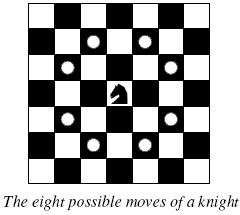TOJ1702 DFS
1702. A Knight's Journey
Time Limit: 1.0 Seconds Memory Limit: 65536K
Total Runs: 1071 Accepted Runs: 389 Multiple test files
Background
The knight is getting bored of seeing the same black and white squares again and again and has decided to make a journey around the world. Whenever a knight moves, it is two squares in one direction and one square perpendicular to this. The world of a knight is the chessboard he is living on. Our knight lives on a chessboard that has a smaller area than a regular 8 * 8 board, but it is still rectangular. Can you help this adventurous knight to make travel plans?
Problem
Find a path such that the knight visits every square once. The knight can start and end on any square of the board.
Input
The input begins with a positive integer n in the first line. The following lines contain n test cases. Each test case consists of a single line with two positive integers p and q, such that 1 ≤ p * q ≤ 26. This represents a p * q chessboard, where p describes how many different square numbers 1, . . . , p exist, q describes how many different square letters exist. These are the first q letters of the Latin alphabet: A, . . .
Output
The output for every scenario begins with a line containing "Scenario #i:", where i is the number of the scenario starting at 1. Then print a single line containing the lexicographically first path that visits all squares of the chessboard with knight moves followed by an empty line. The path should be given on a single line by concatenating the names of the visited squares. Each square name consists of a capital letter followed by a number.
If no such path exist, you should output impossible on a single line.
Sample Input
3
1 1
2 3
4 3
Sample Output
Scenario #1:
A1
Scenario #2:
impossible
Scenario #3:
A1B3C1A2B4C2A3B1C3A4B2C4
DFS, 输出的结果要求是字典序最小的一个 , 所以要从字典序小的点搜起 , 以保证最后的结果符合条件 .
#include<stdio.h> #include<string.h> int step[30][30],s,que[30][30],q,p; bool fix(int a,int b) { if ((a>0)&&(a<=p)&&(b>0)&&(b<=q)) return 1; else return 0; } int dfs(int a,int b) { if (!step[a][b]) step[a][b]=1; else return 0; que[s][0]=a; que[s++][1]=b; if (s>p*q) return 1; if (fix(a-2,b-1)&&(dfs(a-2,b-1))) return 1; if (fix(a-2,b+1)&&(dfs(a-2,b+1))) return 1; if (fix(a-1,b-2)&&(dfs(a-1,b-2))) return 1; if (fix(a-1,b+2)&&(dfs(a-1,b+2))) return 1; if (fix(a+1,b-2)&&(dfs(a+1,b-2))) return 1; if (fix(a+1,b+2)&&(dfs(a+1,b+2))) return 1; if (fix(a+2,b-1)&&(dfs(a+2,b-1))) return 1; if (fix(a+2,b+1)&&(dfs(a+2,b+1))) return 1; step[a][b]=0; s--; return 0; } int main() { int n,solve,i,j,k; scanf("%d",&n); int cas=1; while (n--) { printf("Scenario #%d:/n",cas++); memset(step,0,sizeof(step)); s=1; solve=0; scanf("%d%d",&q,&p); for (i=1;i<=p;++i) for (j=1;j<=q;++j) if (dfs(i,j)) { solve=1; for (k=1;k<=p*q;++k) { printf("%c%d",que[k][0]-1+'A',que[k][1]); } printf("/n/n"); break; } if (!solve) printf("impossible/n/n"); } return 0; }
